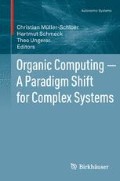Abstract
Self-organisation aspects and the large number of entities in Organic Computing (OC) systems make them extremely hard to predict and analyse. However, the application of OC principles to, e.g., safety critical systems, is usually not conceivable without behavioural guarantees. In this article, a rigorous approach called the Restore Invariant Approach is presented, which provides a specification paradigm and a formal framework that allows to give guarantees for a system despite of self-organisation. The approach provides a method for specifying unwanted system states by constraining the system and defining a corridor of correct behaviour. Furthermore, a decentralised algorithm for monitoring and restoring the invariant based on coalition formation is presented.
Access this chapter
Tax calculation will be finalised at checkout
Purchases are for personal use only
Preview
Unable to display preview. Download preview PDF.
References
Ackermann, J.: Formal description of OCL specification patterns for behavioral specification of software components. In: Workshop on Tool Support for OCL and Related Formalisms, Technical Report LGL-REPORT-2005-001, pp. 15–29, EPFL (2005)
Anders, G., Seebach, H., Nafz, F., Steghöfer, J.-P., Reif, W.: Decentralized reconfiguration for self-organizing resource-flow systems based on local knowledge. In: Proceedings of EASe 2011, Las Vegas, USA (2011, to appear)
Balser, M., Reif, W., Schellhorn, G., Stenzel, K.: KIV 3.0 for provably correct systems. In: Hutter, D., Stephan, W., Traverso, P., Ullmann, M. (eds.) Proc. Int. Wsh. Applied Formal Methods. LNCS, vol. 1641, pp. 330–337. Springer, Berlin (1999)
Bäumler, S., Balser, M., Nafz, F., Reif, W., Schellhorn, G.: Interactive verification of concurrent systems using symbolic execution. AI Commun. 23(2–3), 285–307 (2010)
Blum, M., Kanna, S.: Designing programs that check their work. In: STOC ’89: Proceedings of the Twenty-First Annual ACM Symposium on Theory of Computing, pp. 86–97. ACM, New York (1989)
Branke, J., Mnif, M., Müller-Schloer, C., Prothmann, H., Richter, U., Rochner, F., Schmeck, H.: Organic computing—addressing complexity by controlled self-organization. In: ISoLA, pp. 185–191 (2006)
Goldberg, D.E.: Genetic Algorithms in Search, Optimization, and Machine Learning, 1st edn. Addison-Wesley, Reading (1989)
Güdemann, M., Ortmeier, F., Reif, W.: Safety and dependability analysis of self-adaptive systems. In: Proceedings of ISoLA 2006. IEEE Comput. Soc., Los Alamitos (2006)
Nafz, F., Ortmeier, F., Seebach, H., Steghöfer, J.-P., Reif, W.: A universal self-organization mechanism for role-based organic computing systems. In: González Nieto, J., Reif, W., Wang, G., Indulska, J. (eds.) Autonomic and Trusted Computing. LNCS, vol. 5586, pp. 17–31. Springer, Berlin (2009)
Nafz, F., Seebach, H., Steghöfer, J.-P., Bäumler, S., Reif, W.: A formal framework for compositional verification of organic computing systems. In: Xie, B., Branke, J., Sadjadi, S., Zhang, D., Zhou, X. (eds.) Autonomic and Trusted Computing. LNCS, vol. 6407, pp. 17–31. Springer, Berlin (2010)
Rahwan, T., Ramchurn, S., Jennings, N., Giovannucci, A.: An anytime algorithm for optimal coalition structure generation. J. Artif. Intell. Res. 34(1), 521–567 (2009)
Richter, U., Mnif, M., Branke, J., Müller-Schloer, C., Schmeck, H.: Towards a generic observer/controller architecture for Organic Computing. INFORMATIK 2006 – Informatik für Menschen! P-93, pp. 112–119 (2006)
Shehory, O., Kraus, S.: Methods for task allocation via agent coalition formation. Artif. Intell. 101(1–2), 165–200 (1998)
Torlak, E., Jackson, D.: Kodkod: a relational model finder. In: Grumberg, O., Huth, M. (eds.) Tools and Algorithms for the Construction and Analysis of Systems. LNCS, vol. 4424, pp. 632–647. Springer, Berlin (2007).
Tsang, E.: A Glimpse of constraint satisfaction. Artif. Intell. Rev. 13, 215–227 (1999)
Author information
Authors and Affiliations
Corresponding author
Editor information
Editors and Affiliations
Rights and permissions
Copyright information
© 2011 Springer Basel AG
About this chapter
Cite this chapter
Nafz, F., Seebach, H., Steghöfer, JP., Anders, G., Reif, W. (2011). Constraining Self-organisation Through Corridors of Correct Behaviour: The Restore Invariant Approach. In: Müller-Schloer, C., Schmeck, H., Ungerer, T. (eds) Organic Computing — A Paradigm Shift for Complex Systems. Autonomic Systems, vol 1. Springer, Basel. https://doi.org/10.1007/978-3-0348-0130-0_5
Download citation
DOI: https://doi.org/10.1007/978-3-0348-0130-0_5
Publisher Name: Springer, Basel
Print ISBN: 978-3-0348-0129-4
Online ISBN: 978-3-0348-0130-0
eBook Packages: Computer ScienceComputer Science (R0)

